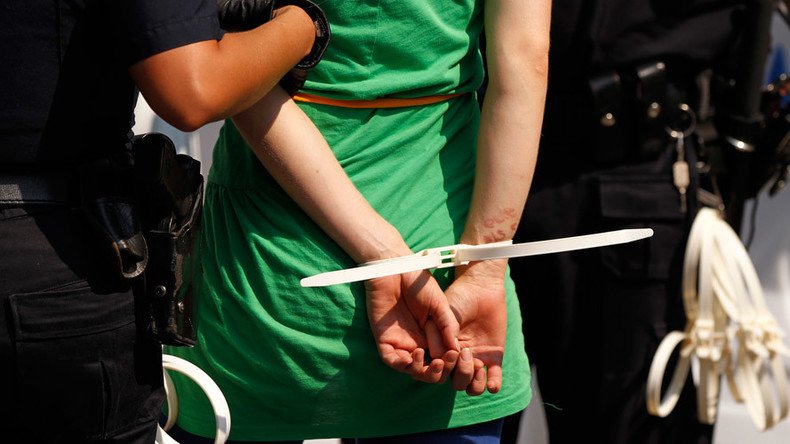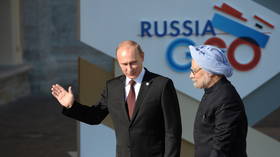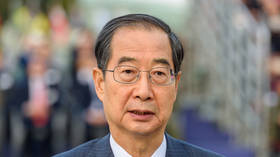NYPD cops still conducting unjustified stop and frisk – report

A federal monitor overseeing changes to the New York Police Department’s stop, question and frisk program said that out of 600 stops analyzed over the course of three months in 2015, nearly a quarter could be viewed as unconstitutional.
The findings come in a 72-page report released on Tuesday. It is the second progress report issued by court-appointed federal monitor Peter Zimroth.
“In almost every case in which [the NYPD’s] Quality Assurance Division found insufficient basis for the stop, frisk or search, the supervisor in that command nonetheless had signed off on the report and noted there was sufficient basis for the stop, frisk or search,” stated the report, which was conducted by the monitor.
Zimroth’s 2nd #stopandfrisk monitor report in Floyd v. NYChttps://t.co/d7RYP03cJSpic.twitter.com/duk6LmM8mm
— John Hawkinson (@johnhawkinson) February 16, 2016
In its findings, the report found that police did not write down a reasonable suspicion for 28 percent of stops, 27 percent of frisks, and 16 percent of searches. The analysis studied the results of a pilot program that looked at approximately 600 new forms between July 1 and September 30, 2015.
The stop-and-frisk program was the center of a landmark federal class action lawsuit, Floyd v. City of New York, where nearly a dozen black and Latino men claimed the police were conducting racial profiling and violating their constitutional rights. At the height of the program under the Michael Bloomberg administration, the NYPD carried out 685,724 stops in 2011.
Color me unsurprised. https://t.co/0nNeBrtlWC
— William Martin (@kg6mov) February 16, 2016
A US district court found in favor of the plaintiffs in 2013 and issued a court order for reforms in the police department, including that the NYPD devise a new form to more thoroughly document the reasons for each stop.
In 2014, stops were down dramatically to approximately 24,000.
Over the three-month period just studied, federal monitor Peter Zimroth said the NYPD saw a 20 percent decrease in reported stops using the new forms.
BREAKING: NYPD officer found guilty in unarmed Akai Gurley shootinghttps://t.co/legBH1AQzl
— RT America (@RT_America) February 12, 2016
The report said the department had disseminated a new Patrol Guide procedure governing stop-and-frisk, instituted new training materials for recruit classes and training, and that stops had decreased, but also that more work has to happen at the supervisory level.
“Ultimately, this is a challenge of leadership, particularly at the levels that interact most directly with the officers engaged in enforcement – sergeants, lieutenants, captains, precinct and unit commanders,” wrote Zimroth in his report.
Zimroth said “transformation of any large government organization is a difficult undertaking,” but he found from focus group sessions and discussions with individual officers that many were not well informed about the changes underway or the reasons for them.
“Many appeared not to understand what is expected of them,” wrote Zimroth. "Getting it right means this: that police officers understand their lawful authority and limit their activities to what is permitted by law.” He reported many officers feel concerned they will be sued or disciplined for making a stop.
Zimroth said officers must also treat the community members professionally, "with dignity and respect and in ways best designed to protect the safety of civilian and officers."
Stingray attacks: NYPD carried out cellphone surveillance more than 1,000 times since 2008https://t.co/zgjCyHLvMBpic.twitter.com/yFqX6rMPqY
— RT America (@RT_America) February 12, 2016
Discussing Zimroth’s findings in interview with Courthouse News, Darius Charney with the Center for Constitutional Rights, the advocacy group representing the plaintiffs in the lawsuit, said the report shows the reforms process “is very much a work in progress.”
Separately, CCR attorneys issued a comment on the report.
“We have long argued that you can write the best policies in the world and have the best training in the world, but unless and until there is commitment to reform at all levels of leadership, little will change,” wrote CCR in its statement. “To succeed, reform must be comprehensive: the NYPD has to overhaul the way it trains, supervises, evaluates, and holds its officers accountable to the communities they serve.”
Mayor Bill de Blasio said that while he hadn't yet read the report, "we understand that we're in a transition" and "the NYPD is working very closely with the federal monitor to figure out how to do things better going forward,”according to the New York Daily News.
The NYPD did not respond to request for comment.












